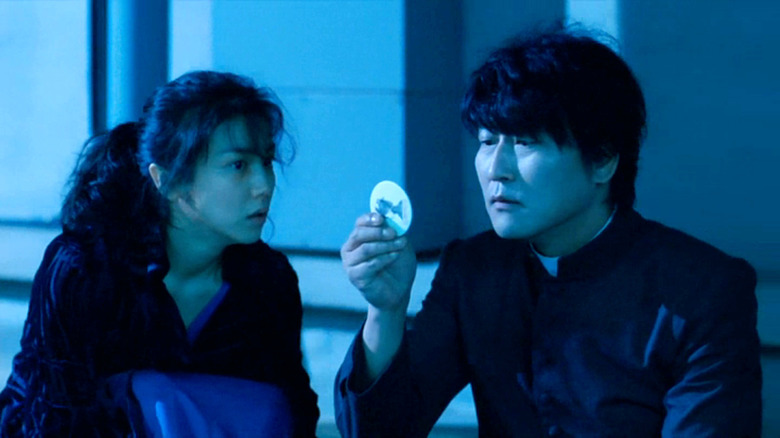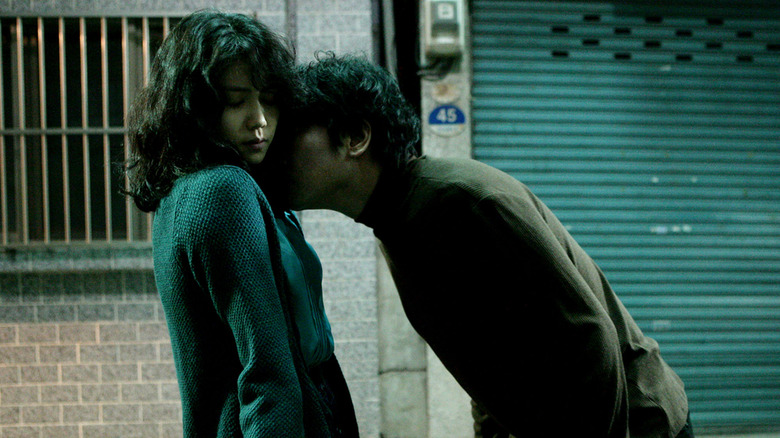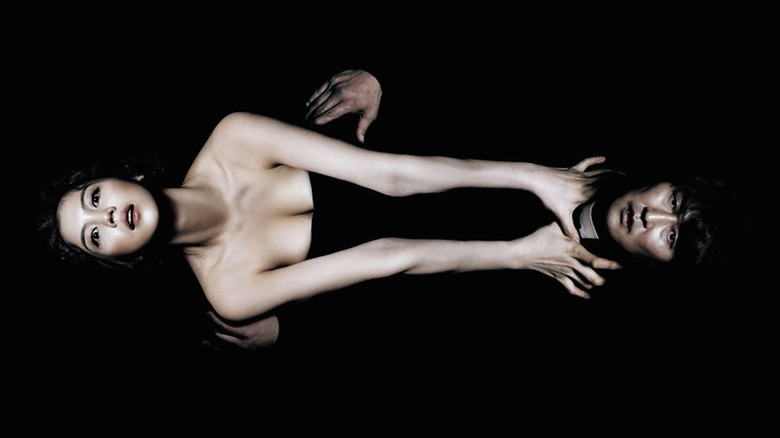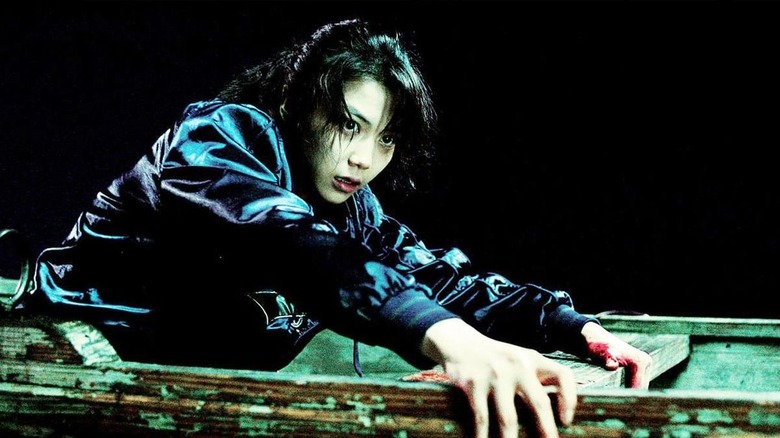Park Chan-Wook's Thirst Is One Of The Best Vampire Movies Of The 2000s
October sees the release of "Decision to Leave," the first feature film in six years from South Korean filmmaker Park Chan-wook. Having premiered in competition at the Cannes Film Festival, where Park won the Best Director award, the noir-drama, centered on a detective who investigates a woman with whom he becomes increasingly enamored, has already racked up plenty of "Best of the Year" credits. It's a testament to his immense talent that "Decision to Leave" isn't even considered a top-tier Park yet is still being heralded by many as a masterpiece.
Park is probably best known to English-speaking audiences for leading the charge of the 21st-century Korean New Wave, in large part thanks to his ultra-violent thriller "Oldboy." The stylish, shocking, and twist-filled movie that featured one of the best one-take action scenes ever shot instantly catapulted Park into the zeitgeist. Everyone from Quentin Tarantino to his occasional collaborator Bong Joon-ho has named him as an inspiration. His consistency across a career that has lasted 30 years has seen him celebrated as one of the most striking directors of his era. While he's mostly talked about in terms of "Oldboy" and his 2016 erotic drama "The Handmaiden," it's in the lesser-watched films of his career where Park's sensibilities shine the brightest. It only makes sense that one of them is a vampire movie.
All about thirst
Released in 2009, "Thirst" was something of a ground-breaking moment in Korean cinema. Not only did it win the Jury Prize at the 2009 Cannes Film Festival, it was the first Korean feature made with both Korean and U.S. studio funding and distribution. Oh, and it was also the first mainstream Korean film with full-frontal adult male nudity. And that's not even the most shocking thing about it.
(Very) loosely adapted from the Victorian novel "Thérèse Raquin" by Émile Zola, "Thirst" follows a Catholic priest named Sang-hyun (played by Song Kang-ho, perhaps most well-known for his starring role in "Parasite"). After having doubts about his faith, he offers to volunteer at an African test facility for a deadly virus. His death wish results in his passing, but not for long, and soon he's made a rapid recovery that the church is keen to claim as a miracle. Sang-hyun is less convinced, especially since he now has miraculous abilities and a craving for blood. He finds distraction from a former childhood friend and his beleaguered wife (Kim Ok-bin), the latter of whom he is instantly enraptured by.
Released at a time when vampire pop culture was experiencing a post-"Twilight" boost, "Thirst" still stands out amid a heavily crowded field. For one thing, it's one of the rare vampire films that's not centered on white people or American/Eurocentric culture. It remains disheartening that vampire stories are so heavily white when practically every world tradition has a story of bloodsuckers or life drainers as part of its mythos. While there is a romance at its heart, and a love triangle to boot (seriously, love triangles were everywhere during the Twi-boom), Park is less concerned with happiness than themes of guilt. His vampires are not creatures of astonishing beauty who revel in eternal life (no offense intended to the very handsome Song Kang-ho.) To be undead is merely to be the worst version of yourself, whether you like it or not.
Tormented by doubt
Sang-hyun is a man tormented by doubt. He fears he is losing his belief in God, and when he receives a "gift" that would confirm his existence for many, he sinks further into self-loathing and a sense of damnation. Upon realizing that he is no longer human, he almost immediately tries to commit suicide. While he tries to only drink blood from safer sources, mainly a comatose patient he regularly visited as a priest, he takes no joy in his feeding. Nor is he buoyed by his congregation's devotion to him as living proof of God's benevolence. He avoids the cult-like group that awaits his every beck and call and eventually destroys his own reputation to get them to stop believing in him. As much as he tries, Sang-hyun doesn't believe that he can be a vampire and a good person. He barely seems to believe he can live a proper life even before he needs to start sucking blood. That process merely sped up his wearily inevitable descent into sin.
This is in sharp contrast to Tae-ju, the emotionally beaten-down wife of Kang-woo, Sang-hyun's sickly childhood friend. Abandoned at her in-laws as a child and married to the spoiled son mostly out of convenience, she is left to be an unpaid servant to the household, put upon at every opportunity and mostly ignored by everyone around her. She clings to Sang-hyun and begins an affair with him, one that seems as much rooted in desperation as true passion. She asks him to kill her husband, implying that he abuses her. After the very messy murder, the pair are haunted by visions of Kang-woo's bloated and sneering corpse. Their guilt climaxes in Tae-ju asking to be killed, but Sang-hyun, terrified of eternal life alone, turns her into a vampire after breaking her neck.
Tae-ju takes to her undead powers with unexpected zeal. She relishes her newfound strength and a chance to be more than the family dogsbody. What starts out as pretty justifiable pushback turns to indiscriminate violence, as Tae-ju feeds on whoever strikes her fancy and shows no qualms over killing others at the drop of a hat. She feels no remorse, not even when she puts her own family through unbridled misery. Why would she regret a chance to have power when everyone else her whole life has wielded it over her with impunity? She has no time for Sang-hyun's Catholic pains, nor his attempts to instil human morality on inhuman creatures. Her predatory instincts were always there, just defanged by her pitiful lot in life. Eventually, she comes to represent all that he fears about himself: they will always be monsters and they should be destroyed for the greater good.
How thirst differs from other 2000s vampire movies
As with the best of Park's films, "Thirst" is balletic in its management of multiple seemingly disparate tones and genres. This is a romance but it's also a horror, a noir, a revenge film, a black comedy, and a fable (and a blood-spree: few directors shoot violence as stunningly as Park Chan-wook.) What could easily fall into trite melodrama never loses its sharp edges or seriousness. Really, "Thirst" is a morality play, another recurring theme in Park's work. He's a filmmaker fascinated by the depths to which seemingly good people will fall and what it takes to spark such a shift.
"Oldboy" features the protagonist committing a taboo so shocking that he cuts his tongue out in an attempt at penance. In "Joint Security Area", one of his earliest films, a group of soldiers find themselves overwhelmed by duty that turns to bloodshed. "Decision to Leave" hinges on the notion that even the most dedicated authority figure, in this case, a detective, will slide into corruption so seamlessly that he may not even notice what's happened until it's too late. "Thirst" elevates those themes to the forefront by having a literal priest at its center, but not much separates Sang-hyun from Park's array of anti-heroes. He just has the foresight to know that he's a monster. It's a quality Park seems to wish more people had.



